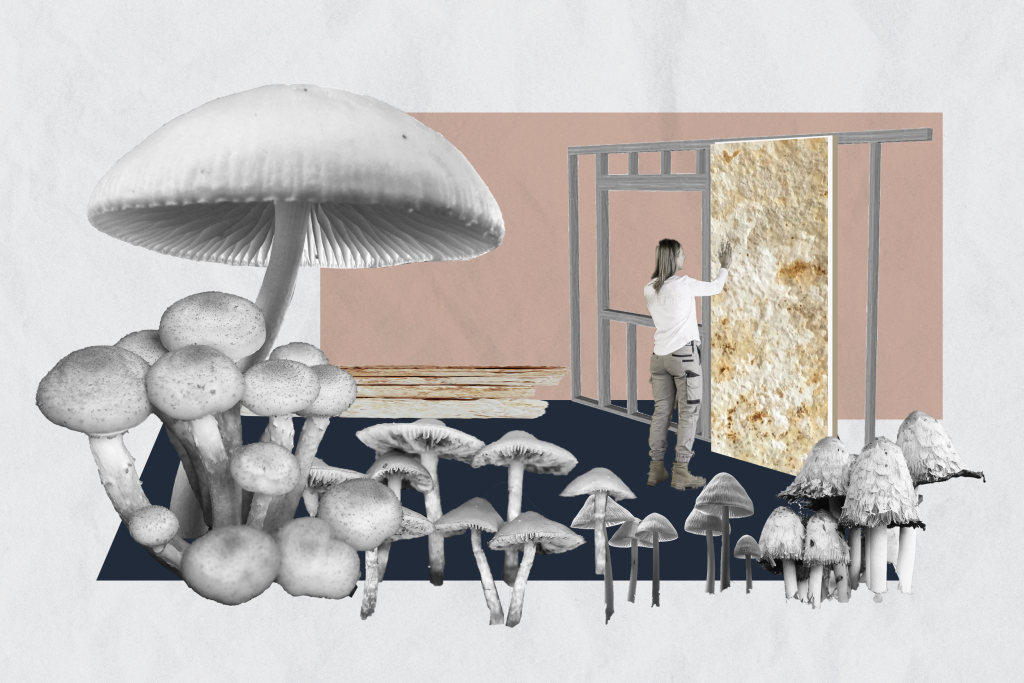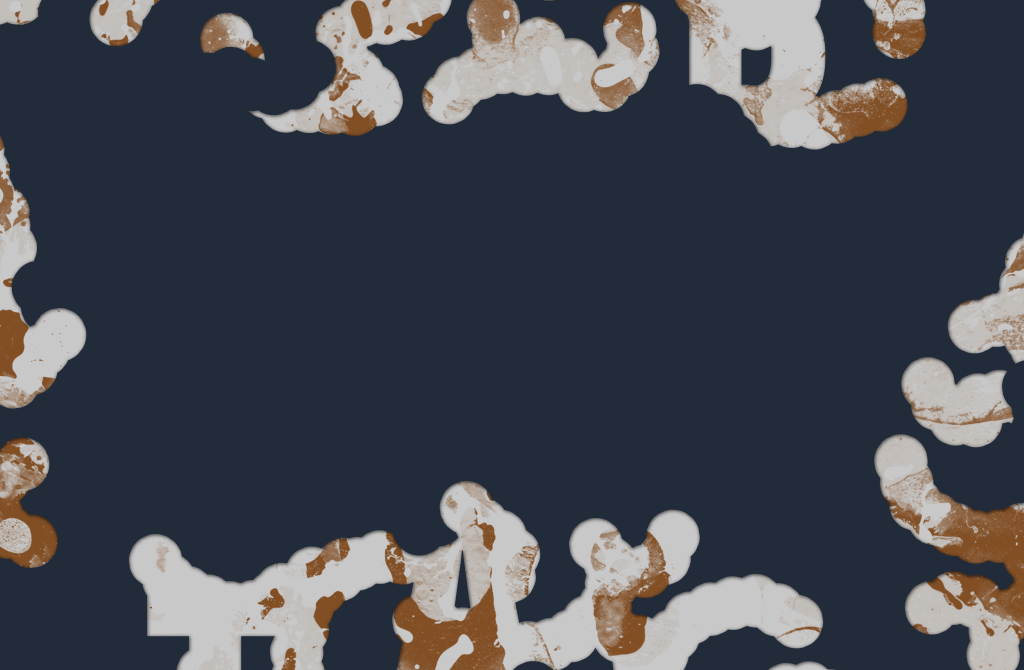Exhibition
Curatorial Exhibition EDIBLE
08.09–20.11.2022
The exhibition transfers the notion of metabolism – growth, decay, digestion, and nutrient release – from the natural world to the domain of cities and buildings. The main objective is to reimagine planetary food systems along with architecture’s capacity to perform metabolic processes.
The selected projects explore the principles of kinship, interspecies alliances, circularity, and localization. From new breeding practices, farming food waste, to synthetic growth and degrowth, EDIBLE aims to generate new visions and to raise critical questions on the rituals, practices and architectures that can emerge from the networks of food production, consumption, distribution, and decay.
Participants in the Curatorial Exhibition will be gathered in five thematic groups:
● Metabolic Home converts the Estonian Museum of Architecture into a living machine and invites visitors to participate in a curated experiment. Each of the seven installations exhibit how metabolic processes related to food are linked to everyday domestic spaces and activities.
Projects by Andrés Jaque (Office for Political Innovation, Spain/USA), Hayley Eber and Mae-ling Lokko (The Cooper Union, South Africa/USA/Ghana), Alexandre Dubor and Cristian Rizzuti (IAAC-Advanced Architecture Group, Spain/France/Italy), Caroline O’ Donnel (Ecological Action Lab, Cornell University, USA), Mitchell Joachim (Terreform ONE, USA), Allison Dring(Made of Air, Germany), Sille Pihlak and Siim Tuksam(PART, Estonia);
● From Brick to Soil questions the origin and lifecycle of our current building materials and showcases a collection of edible, upcycled, productive and compostable building prototypes and components.
Projects by Lola Ben Alon and Sharon Yavo Ayalon(USA/Israel), Iason and Evangelos Pantazis (Topotheque, Greece), Andreas Theodoridis and Christina Ciardullo (Greece/USA), Claudia Pasquero and Marco Poletto(ecoLogicStudio, UK/Italy), Annika Kaldoja and Kärt Ojavee(Studio Aine, Estonia), Siim Karro, Karl Pärtel, Erki Nagla(Myceen, Estonia), Chiara Farinea (IAAC-Advanced Architecture Group, Spain/Italy);
● Food and Geopolitics engages with planetary phenomena and large-scale territories via maps, drawings, films and visualisations of mass migration and food sourcing in challenging environmental conditions and conflict zones.
Projects by Philip Maughan (UK/Germany) and Andrea Provenzano (Italy/Norway), Damiano Cerrone, Jesús López Baeza, Kristi Grišakov, Panu Lehtovuori (SPIN Unit, Estonia/Finland), Mason White and Lola Sheppard (Lateral Office, Canada), Robert Charles Johnson (Fatconomy, UK), Rania Ghosn and El Hadi Jazairy (Design Earth, USA/Lebanon/Algeria), Anastasios Telios, Despoina Zavraka, Dimitrios Chatzinikolis, Georgios Grigoriadis(Greece).
● The Archaeology of Architecture and Food Systems displays an archive of radical, speculative projects that architects and artists have envisioned throughout the twentieth century. Curated by Lydia Kallipoliti with Sonia Ralston and Sanjana Lahiri.
● Finally, the Future Food Deal is a curatorial initiative that urges architects and designers to reimagine planetary food systems, along with architecture’s expressive capacity to metabolize, digest and generate resources. In the exhibition it becomes an open library that is comprised of manuals, cookbooks, visionary drawings, and manifestos. The Future Food Deal’s contents were generated from two actions: Visions, which come via invitations to representatives of prominent research centers and institutions, and Cookbooks, which are the results of an Open Call.
Visions
What is the future of food systems and urbanity? What will it be in 2050? Invited participants were posed these questions and related issues, including food justice, species interdependencies, global political alliances, and/or obsolete infrastructures. Such exploration was encouraged through visualizations and expression of power dynamics—who gets to benefit from ecological catastrophe, who does not, and what would it look like? Suggested themes included: Farm and City (Production | Urban Farming | Automation | Interspecies Ecologies | New breeding practices), From Urban Farm to Fork (Distribution | 0 food miles practices | new urban infrastructure | transparent transactions), All You Can Eat (Consumption | Food passports | Accelerated Growth | Synthetic Food), Eaten Away (Decomposition | Food Waste | New nutrients | Upcycled Matter), and Food Justice (Accessibility | Food Sovereignty | Supply & Demand | Culture).
Complete list of participants is as follows: Galo Canizares and Stephanie Sang Delgado, office ca/Kean University; John Doyle and Graham Crist, RMIT; Panos Dragonas, University of Patras; Joseph Michael Godlewski, Syracuse University; Ariane Harrison, Cathryn Dwyre, Wei Lin, Elliott Maltby, Humna Naveed, Nancy Smith, Inclusive Ecologies, Pratt Institute; Ferda Kolatan, University of Pennsylvania; Korina Filoxenidou and Katerina Kotzia, University of Ioannina; Leire Asensio-Villoria and David Mah, Melbourne School of Design; Polyxeni Mantzou, Democritus University of Thrace, AVLab Department of Architectural Engineering; Ian Nazareth and Xin Fang, RMIT; Carlo Ratti, MIT Senseable City Lab; Mosè Ricci, University of Trento with Politecnica University of Marche and Mediterranean University of Reggio Calabria; Antonio Scarponi, Zurich University of the Arts; Michael Young & Kutan Ayata, Young and Ayata; Erin Besler, Princeton University; Laia Celma, Penn State University; Alfredo Brillembourg, University of Bergen/Urban Think Tank; Sky Lo Tian and Liu Ruiling, Harbin Institute of Technology (ShenZhen); Karli Luik, Johan Tali, and Harri Kaplan, Molumba; Philip F. Yuan, Tongji University; Dimitris Kontaxakis, Dimitris Gourdoukis, and Giorgos Dimopoulos, Aristotle University of Thessaloniki; Vicente Guallart and Alex Hadley, Institute for Advanced Architecture of Catalonia, Valldaura Labs; Winy Maas, Delft University of Technology/The Why Factory; Mireia Luzárraga and Alejandro Muiño, TAKK; Ana Miljacki, Massachusetts Institute of Technology; Edgar Gonzalez and David Jeffrey Goodman, IE School of Architecture and Design; David Eugin Moon, Columbia University GSAPP; Alicia Lazzaroni and Antonio Bernacchi, Aarhus School of Architecture; Hadin Charbel and Déborah López, UCL, The Bartlett School of Architecture; Sophia Vyzoviti, University of Thessaly; Wendy W. Fok, University of Southern California Architecture; Kathy Velikov and Geoffrey Thun, University of Michigan; Claudia Pasquero, Synthetic Landscape Lab, Innsbruck University; Alexandros Tsamis, Center for Architecture Science and Ecology, Rensselaer Polytechnic Institute; Daisy Ames, The Cooper Union/Studio Ames; Enric Ruiz Geli and Aaron Betsky, Virginia Tech; Josep Ferrando, Joe Morris, Elly Ward, Ricardo Devesa, and Marco Mosca, School of Architecture of La Salle (ETSALS), Ramon Llull University; Tom Verebes and Marcella Del Signore, New York Institute of Technology; Jörg Schröder, Leibniz Universität Hannover; Dana Cupkova, Carnegie Mellon; Anna Puijaner, MAIO/Columbia University GSAPP; Laura Narvaez, Andy Bow, Bruno Moser (F+P) and Mathilde Marengo (IAAC), IAAC Advanced Architecture Group + Fosters and Partners; Behnaz Farahi and Laure Michelon, California State University Long Beach, (CSULB) and University of California Los Angeles (UCLA); Cathryn Dwyre and Chris Perry, Rensselaer Polytechnic Institute; Florencia Pita, Florencia Pita & Co; Jimenez Lai, Bureau Spectacular; Manuel Gausa, UNIGE; Anna Dyson, Yale Centre for Ecosystems and Architecture; Javier Peña Galiano, University of Alicante.
Cookbooks
The Cookbooks initiative was an open call to solicit design research projects that confront principles of kinship, interspecies alliances, circularity, and localization possible in the networks of food production, consumption, distribution, and decay. What new rituals, practices, and architectures are possible in the future when thought together in this way? These questions and possibilities were developed in the form of guidelines and manuals that could potentially become the new cookbooks of food-driven or food-oriented projects within design disciplines.
Complete list of participants is as follows: Iyad AbouGaida, Marylynn Antaki, Bahaa Ghoussainy, Rana Samara, and Ibrahim Kombarjij; Camila Andino and Beau Avedissian; Taylor Boes, Ryan Clement, and Angie Door; Jarek Adamczuk, Alice Clarke, Andrew Ó Murchú, and Kate Rushe (Both And Group); Michael Collins Architects; Tilok Costa; Ioana Giurgiu and Joerg Baumeister; Jeth Owen Guerrero; Jana Horvat; Emma Jurczynski; Dimitris Karakontinos; Sophie Krauss; Reese Lewis; Tina Marinaki; Jakob Mahla; Joel McCullough; Tevi Allan Mensah and Eugénie Palau; Ahzin Nam; Rohit Nandha; Daniela Lopes Peñaloza; Lisa Prossegger, Helena Schenavsky and Sara Enab; Montserrat Bonvehi Rosich and students of “The Desert We Eat” at Harvard GSD supported by SOM Foundation, including Supriya Ambwani, Quoc Dang, Mike Deloge, Kiki Dickson Cooper, Matthew Gorab, Alaa Hamid, Emily Majors, Elsa Mendoza, Sam Pires, Tracy Tan, Raphi Tayvah, Sophia Xiao; Pablo Reyes, Diego Román, Vicente Siña and Manuel Vega; Sophie Schaffer and Katharina Sauermann (Zoo Studio/VIE); Sasha Smorodinova, Sean Graves, Johan Michalove and Hann Paniutsich; Alexandra Stratou, Leonidas Kalpaxidis and Iris Vasilopoulou; Minjeong Song and Jihyuk Choi (Studio Kyuh); Agnes Tatzber, Sander Blomsma and Bahar Orçun; Johnny Tran; Wei Wen; Ruizi Zeng.

